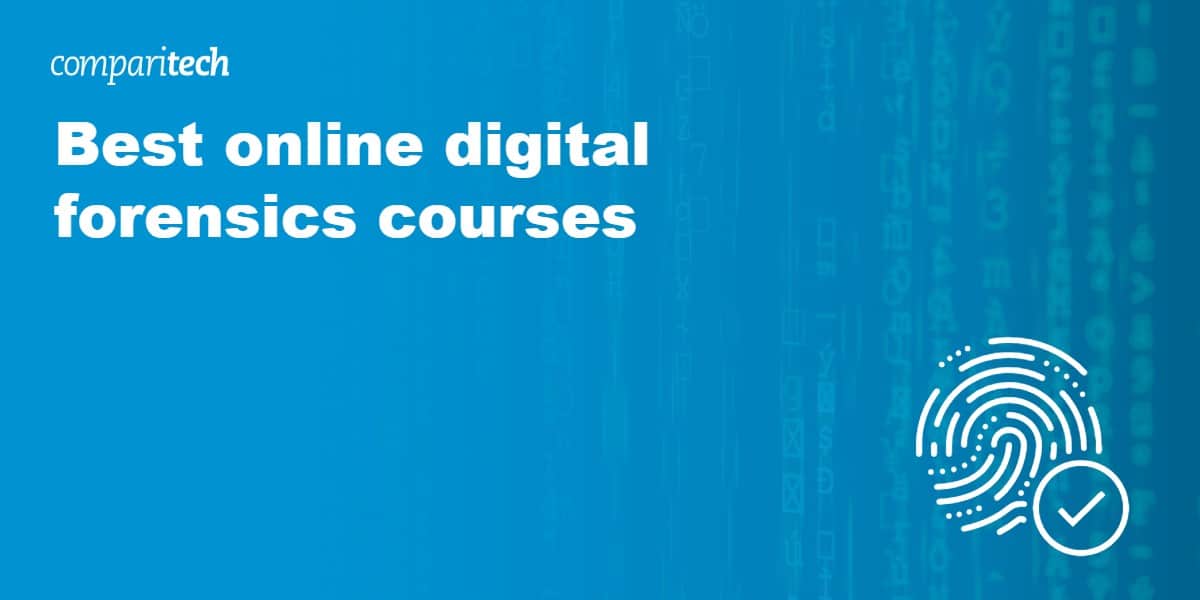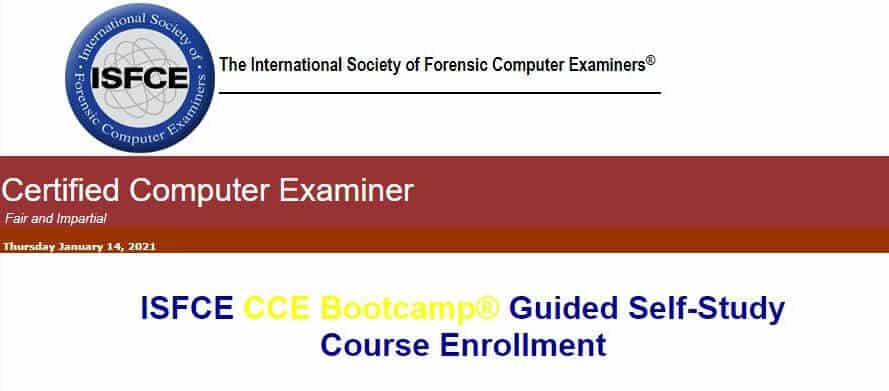
Fancy yourself as a digital detective? If you’re considering a career in cybersecurity or are looking to advance in your current role, the field of digital forensics could be a great fit. Digital forensics professionals investigate crimes that involve computers and other digital devices, and gather evidence that may be used to support a case. But like all fields of information security, it can be difficult to know where to get started. Thankfully, there are some excellent digital forensics courses available to help.
These range from basic programs designed for beginners, right up to comprehensive courses that lead to full accreditation as a digital forensics investigator.
Here’s an at-a-glance look at our top recommended digital forensics courses, but we’ll go into greater detail below.
Best online digital forensics courses:
- StationX Complete Cyber Security Course: A course bundle designed to enhance your knowledge of all areas of cybersecurity including digital forensics.
- edX Computer Forensics: A graduate-level course for those who already have some experience in technical fields.
- Cybrary: This digestible program helps you work towards a CHFI certification.
- Udemy Digital Forensics and Electronic Evidence: A bitesize course that provides an introduction to the world of digital forensics.
- ISFCE CCE Bootcamp® Guided Self-Study Course: A fully online program to help you prepare for the CCE exam.
- GCFE (SANS GIAC): Choose on-demand delivery or a live online course to prepare for the GCFE exam.
There is a broad range of courses available with something for everyone. Each of our recommended programs fit most or all of the following criteria:
- Can be completed fully online
- Provides good value for money
- Offered by a reputable organization
- Works toward a recognized certification
Best digital forensics courses
Here’s our full list of the best digital forensics courses available:
1. StationX Complete Cyber Security Course
StationX covers digital forensics and a ton of other topics in its Complete Cyber Security Course. The program covers a broad range of subjects including firewalls, encryption, online anonymity, authentication, antivirus, and much more. It comprises four main volumes:
- Hackers Exposed (11 hours of video)
- Network Security (12.5 hours of video)
- Anonymous Browsing (13.5 hours of video)
- End Point Protection (16.5 hours of video)
The course promises to teach you exactly what hackers do and how you can stop them. It delves deep into global hacking and tracking infrastructures, including how to weaken them.
The StationX Complete Cyber Security Course bundle is great for anyone who wants to boost their knowledge of information security, but is ideal for those considering a career in the field. It will offer plenty of knowledge of digital forensics, but will also give you insight into other areas of cyber security, helping you decide which field you want to pursue further.
This is also a good fit for anyone already in a cyber security career who wants to expand their knowledge on a range of topics.
Price: The course alone is priced at $500, but you can purchase the StationX VIP Membership instead. This is usually $1,199 per year but the current discount price is just $149 per year. Plus you don’t just get access to the Complete Cyber Security Course; you can take any course in the StationX catalog.
2. edX Computer Forensics
edX’s Computer Forensics course teaches the principles behind digital forensics investigations as well as the techniques required to be successful. edX is a non-profit that provides free courses funded by certification sales. This is a graduate-level program designed for students who have already completed a Bachelor’s degree in a STEM field or those who have five years or more of work experience in a technical field.
This course introduces you to the range of tools available for use in investigations and teaches you the main techniques and principles used in digital forensics. You’ll also delve into the intricate procedures involved in ensuring the admissibility of evidence in court and learn about the ethical and legal implications of digital forensics work.
At the end of the program, you’ll be familiar with performing investigations on both Linux and Windows systems.
This course can be taken as a component of the RITx Cybersecurity MicroMasters Program that also includes four other modules. The MicroMaster’s program can be used to help gain admission to RIT’s full Master’s program. That said, you can simply choose to take this as a standalone course if you wish.
Price: edX Computer Forensics is actually free to take, but if you want a certification, you’ll need to pay $249.
3. Cybrary
Are you looking to earn your Computer Hacking Forensics Investigator (CHFI) certification? This course can help you get there. The CHFI exam is a four-hour test provided by the EC-Council and can help you land a digital forensics role. This course is designed for those already working in the IT industry with some background knowledge of information security, and will prepare you for the CHFI exam.
Computer Hacking and Forensics comprises 15 modules, and delivery is a combination of videos and virtual labs. Topics include investigation processes, hard disks and file systems, anti-forensics, web attack investigation, malware, and mobile.
At the end of the program, you’ll have discovered how to spot online criminal activity, gather evidence in the appropriate manner, and thoroughly investigate wireless attacks. This includes in-depth knowledge of establishing and maintaining the “chain of custody” required for evidence that may be presented during legal proceedings.
Price: Cybrary offers limited access to its courses for free, but to unlock full programs you’ll need to pay a monthly subscription fee. If you pay on a monthly basis, it’s $59 per month, but if you subscribe for a year upfront, you get a slight discount and pay an average of $54 per month. The value here really depends on how quickly you get through the course. For example, it’ll be a lot cheaper if you can get it done within one month versus spreading it over two or three.
4. Udemy Digital Forensics and Electronic Evidence
Are you simply looking for a taster course in digital forensics and not quite ready to make a large commitment of time or funds just yet? Then an Udemy course might be the right fit for you. The highly-rated Digital Forensics and Electronic Evidence training is geared towards legal professionals but is suitable for anyone interested in the field.
Areas covered in this one-hour long course include permissions required to obtain electronic evidence, chain of custody procedures, and how evidence is collected and analyzed. You’ll also learn what must be included in a court-permissible forensic report.
If this course doesn’t seem like a good fit, there are a ton of other related programs on Udemy to choose from, including:
- Digital Forensics for Pentesters – Hands-on Learning (5.5 hours)
- Virtual Machine Forensics (1.5 hours)
- Computer Forensics Fundamentals ( 1 hour)
Price: This program usually costs $19.99 but is on sale for $12.99 at the time of writing. Most courses on Udemy go on sale frequently, but even regular prices are usually affordable. That said, if you’re planning to take multiple courses, it may make more sense to go for a heavily discounted bundle such as that offered by StationX.
5. ISFCE CCE Bootcamp® Guided Self-Study Course
The Certified Computer Examiner (CCE) certification, bestowed by the International Society of Forensic Computer Examiners (ISFCE), is a prestigious credential in the digital forensics field. To earn this certification, candidates must successfully pass an online written examination and various practical tests. Many organizations require this certification for certain roles, either as a hiring criterion or as part of ongoing professional development.
The ISFCE provides a “boot camp” style course for aspirants, both in-person and online. The in-person version is a rigorous, one-week program conducted in classrooms or labs. Conversely, the online option offers flexibility, allowing candidates to study from home and complete the course over up to one year. Each participant is paired with an instructor for email support and feedback on their work.
Price: The online boot camp costs $3,795, with a reduced fee of $3,595 for law enforcement, military, and government personnel. Payment plans are available, offering the option to pay in three installments.
6. GCFE (SANS GIAC)
Are you looking to complete an even more advanced certification such as a Global Information Assurance Certification (GIAC)? The SANS Institute offers its GCFE program to help you prepare for the GIAC Certified Forensic Examiner (GCFE) certification. This confirms candidates computer forensic analysis knowledge, with a focus on data collection and analysis pertaining to Windows systems. It’s a prerequisite for some roles in the digital forensics field.
The GCFE (SANS GIAC) program is continuously updated and will teach you everything you need to know to be successful in the examination. The main topics include in-depth analysis of Windows operating systems, the identification of artifacts and evidence, and the extraction of critical answers.
There are three delivery options: in-person, live online, and on-demand. With the lattermost, you have four months to complete the course. The program includes labs and other exercises as well as support from subject matter experts.
If you’re looking for an even more advanced course, the SANS Institute also offers the GCFA (SANS GIAC), although it’s recommended you complete the GCFE course first.
Price: The cost may vary depending on the delivery method you choose, but it will likely be around $7,000 plus $800 to take the GIAC certification exam.
Online digital forensics courses FAQs
Is digital forensics a good career?
Digital forensics can be a very rewarding and challenging field to work in. If you are interested in working with computers and solving complex puzzles, a digital forensics career might be a good fit for you. There are many different specializations within the field of digital forensics, so you can find an area that interests you and focus your career in that direction. In addition, with the ever-growing reliance on technology in our society, the demand for qualified digital forensics professionals is expected to rise in the coming years. So if you are looking for a challenging and rewarding career, digital forensics might be the right path for you.
Does digital forensics require programming?
Programming is not typically required for digital forensics careers, but it can be helpful in some cases. If you are interested in pursuing a career in digital forensics, you should focus on developing strong analytical and problem-solving skills. In addition, many of the tools and techniques used in digital forensics are based on computer science principles, so a programming background can help understand how these tools work. However, not all digital forensics jobs require programming skills, so don’t let the lack of programming knowledge deter you from pursuing a career in this field.
Are there any prerequisites for these courses?
Here’s a summary of the prerequisites for the digital forensics courses listed in the Comparitech article:
- StationX Complete Cyber Security Course: No specific prerequisites, suitable for anyone interested in information security.
- edX Computer Forensics: Designed for students with a Bachelor’s degree in a STEM field or those with five or more years of work experience in a technical field.
- Cybrary: Intended for IT professionals with some background knowledge of information security.
- Udemy Digital Forensics and Electronic Evidence: Suitable for anyone interested in the field, but geared towards legal professionals. No specific prerequisites.
- ISFCE CCE Bootcamp® Guided Self-Study Course: No specific prerequisites, but the course prepares you for the Certified Computer Examiner (CCE) certification, suggesting some existing knowledge or experience in the field could be beneficial.
- GCFE (SANS GIAC): No specific prerequisites, but the course prepares you for the GIAC Certified Forensic Examiner (GCFE) certification, suggesting some existing knowledge or experience in the field could be beneficial.
Remember, while these courses may not have specific prerequisites, having some prior knowledge or experience in IT or cybersecurity could be helpful.
See also:






